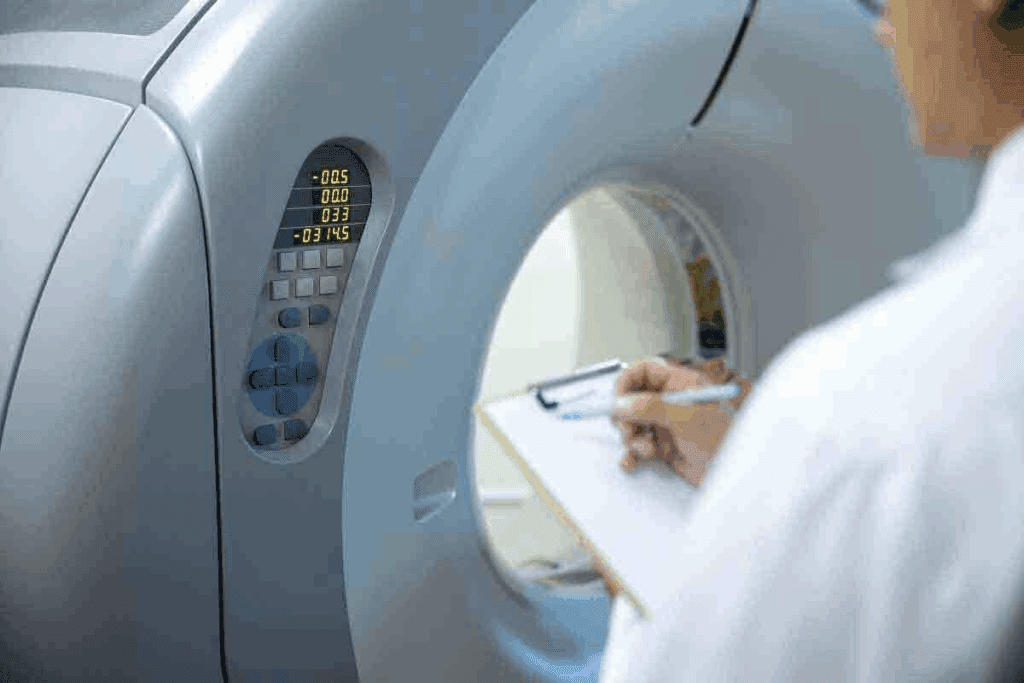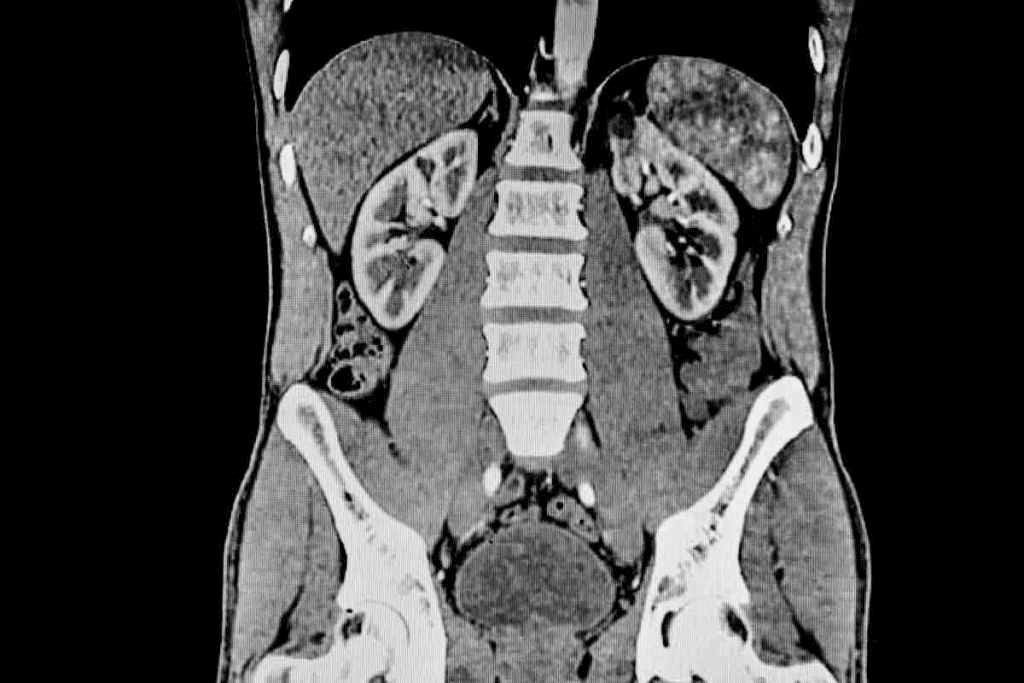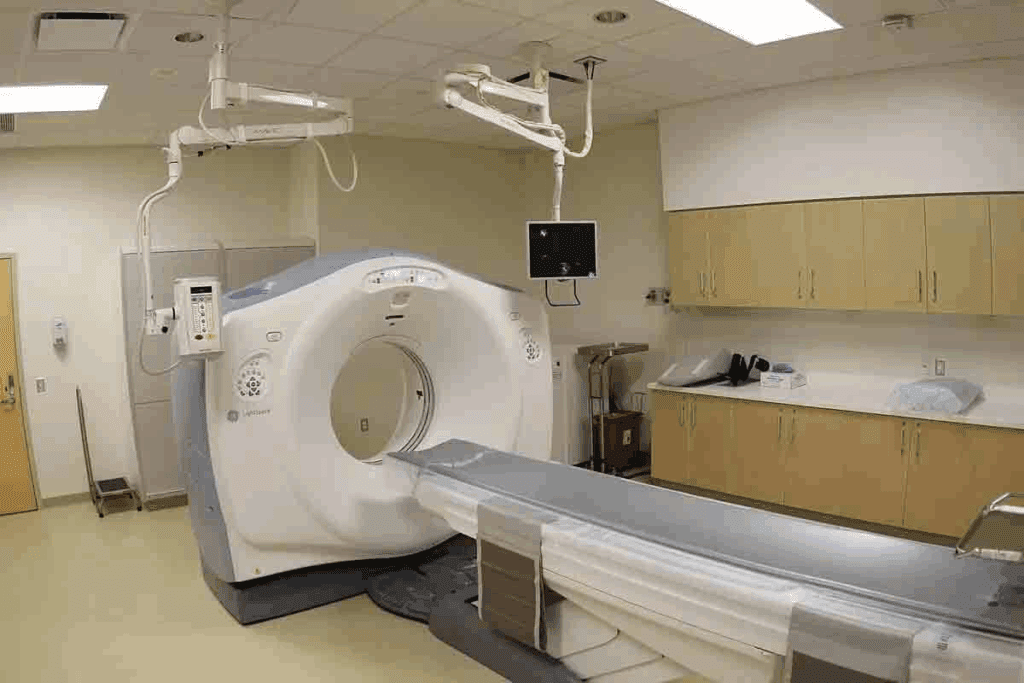
Getting ready for a kidney CT scan is key for good results and a smooth process. At Liv Hospital, we stress the need for proper prep. This makes sure you’re safe and comfortable during the test.
A renal CT scan is vital for spotting kidney problems. It gives clear images that help detect issues like stones, tumors, and infections. Our guide will help you prepare, understand what happens during the scan, and interpret the results.
Key Takeaways
- Understand the importance of proper preparation for a kidney CT scan.
- Learn the steps to prepare for a renal CT scan.
- Discover what to expect during the scanning process.
- Gain insights into understanding your CT scan results.
- Find out how Liv Hospital ensures your comfort and safety.
Understanding Renal CT Scans and Their Diagnostic Value

Renal CT scans are key in spotting many kidney issues. CT scans of the kidneys give detailed pictures. These help doctors diagnose and treat kidney diseases.
What Kidney CT Scans Can Detect
Kidney CT scans find many problems, like renal stones, tumors, infections, and cysts. They’re great for spotting kidney stones. These can cause a lot of pain and serious issues if not treated right away.
- Renal calculi (kidney stones)
- Tumors and cysts
- Infections and abscesses
- Structural abnormalities
CT scans help doctors plan the best treatment. For example, they can show how big and where kidney stones are. This helps decide if surgery is needed.
Common Conditions Diagnosed with Renal Imaging
Renal imaging with CT scans is key in finding many kidney issues. Some common ones include:
- Kidney Disease: CT scans spot problems like cysts or tumors in kidney disease.
- Renal Cell Carcinoma: A kidney cancer type that CT scans can find.
- Pyelonephritis: A kidney infection that CT scans can diagnose.
Knowing how renal CT scans work helps patients understand their health better. With the detailed images from CT scans, doctors can give more precise and effective care.
Types of Renal CT Scan Procedures You May Undergo

Renal CT scans are key for diagnosing kidney issues. They come in different types to meet various medical needs. The choice of CT scan depends on the condition and the information needed by your doctor.
Non-Contrast Kidney CT Scans
Non-contrast CT scans show the kidneys without contrast material. They’re great for finding kidney stones, calcifications, and tumors. These scans help doctors see the kidneys’ size, shape, and position.
Non-contrast CT scans are quick and easy, needing little preparation. But, they might not show as much detail as contrast-enhanced scans in some cases.
CT Scan with Contrast of Kidneys
A CT scan with contrast uses dye injected into a vein to highlight kidney structures. It’s excellent for checking blood vessels, finding tumors, and kidney function.
The contrast dye makes different tissues and problems stand out, giving a clearer kidney image. But, talk to your doctor about any concerns, like allergies or kidney disease, before the scan.
CT Stonogram for Kidney Stones
A CT stonogram is a special CT scan for kidney stones. It’s very good at finding even small stones that other tests might miss.
This scan is great for figuring out why you have severe pain from kidney stones and for planning treatment. It helps doctors see the size, location, and number of stones.
When Your Doctor Orders a Kidney CT: Initial Preparation Steps
When your doctor orders a kidney CT scan, it’s key to know the first steps. A kidney CT scan is used to see the kidneys and the nearby areas. We’ll help you get ready for a smooth and successful test.
Understanding Your Referral and Indication
First, find out why your doctor wants you to have a kidney CT scan. They might be checking for kidney problems or keeping an eye on them. Knowing why helps you prepare and ask the right questions.
Scheduling Your Appointment Effectively
Booking your kidney CT scan is important for a quick test. Call the imaging center or hospital fast to set up your time. Have your insurance and medical history ready. You might also want to ask about wait times.
Discussing Your Medical History and Concerns
Talk about your medical history and worries with your doctor before the scan. Share about your kidney health, allergies, and current meds. This helps keep you safe during the test.
By understanding your referral, scheduling well, and discussing your health, you’re set for a good kidney CT scan. We’re here to help every step of the way.
Pre-Scan Medical Evaluations and Safety Assessments
Before a kidney CT with contrast, several important evaluations are done. These ensure your safety and the success of the test. At our institution, we focus on your well-being through detailed assessments.
Creatinine Level Testing for Kidney Function
Creatinine level testing is a key evaluation. It checks how well your kidneys are working. This test is vital because it shows if it’s safe to use contrast material.
Creatinine levels show kidney health. High levels mean your kidneys might not be working right. This could change if you can have a CT scan with contrast.
Medication Adjustments Before Imaging
Reviewing your medications is also important. Some drugs might need to be changed or stopped before the scan.
Tell us about all your medications, including supplements and over-the-counter drugs. This helps us make sure you’re safe during the scan.
“It’s vital to tell your healthcare provider about all medications and supplements before a CT scan.”
Allergy Considerations for Contrast Material
Allergies to contrast materials are also checked. If you have allergies, tell your healthcare provider.
We take allergies seriously to avoid bad reactions during the scan. Sometimes, we give medication to lower the risk of an allergic reaction.
We look at your medical history, creatinine levels, and allergies carefully. This ensures a safe and effective kidney CT with contrast. Our aim is to give you the best care and reduce risks.
One Week Before Your Renal CT Scan: Preparation Timeline
Start preparing a week before your renal CT scan to get the best results. This time is key for adjusting your meds and starting hydration.
Medication Review with Your Healthcare Provider
Check your meds with your doctor. Some, like metformin, might need to be changed or stopped before the scan. Your doctor will guide you based on your health.
“Changing your meds before a renal CT scan is very important,” says a top radiologist. “We check your meds to keep you safe during the scan.”
Hydration Guidelines to Follow
Drinking enough water is key before a renal CT scan, more so with contrast. It helps your kidneys and gets rid of the contrast.
- Drink 8-10 glasses of water a day, unless your doctor says different.
- Stay away from caffeinated and carbonated drinks, as they can make you lose water.
- Watch your urine; it should be pale yellow, showing you’re hydrated.
By following these tips and talking to your doctor about meds, you’ll be ready for your scan. If you’re unsure or have questions, talk to your healthcare team.
The Day Before Your Kidney Contrast CT Scan
Your kidney contrast CT scan is just a day away. We’re here to help you get ready. It’s important to follow certain guidelines for a smooth and successful scan.
Dietary Restrictions and Fasting Requirements
To get ready for your kidney CT with contrast, you might need to follow some dietary rules. It’s key to listen to your doctor about fasting and diet. You might need to skip eating or drinking for a while before the scan. This ensures the contrast material works well.
Some foods or medicines could mess with the scan or the contrast. Talk to your healthcare provider about any worries or questions. They can give you advice based on your health and the scan’s needs.
| Dietary Guidelines | Instructions |
| Fasting | Avoid eating and drinking for the specified period before the scan |
| Hydration | Drink plenty of water as instructed by your healthcare provider |
| Medications | Inform your doctor about any medications you’re taking and follow their advice |
Hydration Instructions and Importance
Drinking enough water is key before a kidney CT with contrast. Water helps your kidneys work properly and lowers the risk of kidney problems. Your doctor will tell you how much water to drink before the scan.
It’s very important to follow these hydration tips for your safety and the scan’s success. If you have any questions or concerns, talk to your doctor.
What to Pack for Your Appointment
Coming prepared to your kidney CT appointment makes things easier. Bring your insurance cards and ID. Also, have a list of your medicines and any important health history.
Wear comfy, loose clothes and avoid metal items like jewelry. This makes changing into a gown easy and helps with the scan.
- Insurance cards and identification
- List of current medications
- Relevant medical history
- Comfortable, loose-fitting clothing
Day of the Procedure: Final Preparation Steps
On the day of your renal CT scan, it’s important to follow some final steps. This will help make the procedure smooth and successful. We know it can be a bit scary, but being ready can really help.
Morning of the Scan Checklist
Begin your day by checking the instructions from your healthcare team. Make sure you have all the documents you need, like past imaging and your current medications. Having a light breakfast is okay unless you’re told not to.
- Review and bring all necessary documents
- Take any prescribed medications as directed
- Wear comfortable, loose-fitting clothing
Arrival and Registration Process
Arrive at least 30 minutes before your appointment. This gives you time for the registration process. You’ll need to verify your insurance and finish any paperwork. Our staff will help you with this, making sure everything is ready for your scan.
Be prepared to provide:
- Insurance cards and identification
- Any relevant medical records or test results
- A list of your current medications and dosages
Changing and Removing Metal Objects
You’ll need to change into a hospital gown before the scan. This is to make sure your clothes don’t get in the way. You’ll also have to remove any metal items, like jewelry or glasses, as they can mess up the images.
IV Insertion for Contrast Studies
If you need contrast material for your scan, an IV line will be put in. Our team will make sure this is as comfortable as possible. The contrast material makes the images clearer, helping your doctors see more.
By following these steps, you’ll be ready for your renal CT scan. If you have any questions or worries, talk to your healthcare provider. We’re here to help you through this.
What to Expect During and After Your Kidney CT
Knowing what to expect during and after your kidney CT scan can ease your worries. We aim to make you feel comfortable and well-informed throughout the process.
The Scanning Process and Duration
The kidney CT scan is quick and easy. You’ll lie on a table that slides into a large, doughnut-shaped machine. The scan itself takes just a few minutes. But getting ready and the whole process can take about 30 minutes to an hour.
Key steps during the scanning process include:
- Lying very quietly on the scanning table for clear images
- Holding your breath for short times as the technician tells you
- Being alone in the room, but the technician will watch from another room
Sensations During Contrast Injection
If your scan uses contrast material, you might feel some things during the injection. You might feel:
- A warmth or flushing feeling
- A metallic taste in your mouth
- A bit of nausea, but this is rare
These feelings are usually short-lived and go away soon after the injection. We assure you, these are normal and nothing to worry about.
Post-Scan Care and Hydration
After your scan, you can go back to your usual activities unless your doctor says not to. To help your body recover:
- Drink lots of water to flush out the contrast material, if used
- Follow any specific instructions from your healthcare provider
- Watch for any unusual symptoms or reactions, though these are rare
Staying hydrated and following any post-scan instructions will help you recover smoothly.
Conclusion: Understanding Your Results and Next Steps
After a renal CT scan, it’s key to understand your results and what comes next. We’ve walked you through how to prepare. Now, it’s time to talk about your findings with your doctor.
Your doctor will explain what the scan shows. They’ll tell you about any conditions or issues found. This talk will help figure out your next steps, like treatment or more tests. It’s important to ask questions and clear up any doubts you have.
Knowing your results is the first step in managing and treating any conditions. By working with your doctor, you can create a plan that fits your needs. This ensures the best results for you.
We’re here to support you on your healthcare path. We’ll provide the guidance and care you need to address your specific concerns.
FAQ
What is a renal CT scan, and how does it help in diagnosing kidney diseases?
A renal CT scan uses X-rays and computer technology to show detailed kidney images. It spots issues like stones, cysts, and tumors. This helps doctors diagnose kidney diseases.
What is the difference between a non-contrast kidney CT scan and a CT scan with contrast of the kidneys?
A non-contrast kidney CT scan finds stones and damage without contrast. A CT scan with contrast uses dye to highlight the kidneys and urinary tract. It helps find tumors or vascular diseases.
What is a CT stonogram, and when is it used?
A CT stonogram is a special CT scan for kidney stones. It’s a non-contrast scan that shows the kidneys, ureters, and bladder. It finds stones and other issues.
How do I prepare for a kidney CT scan with contrast?
To prepare for a kidney CT scan with contrast, follow certain steps. You’ll need to fast, tell about allergies or health issues, and adjust your meds as advised.
What are the common side effects of contrast material used in kidney CT scans?
Common side effects of contrast material include rash, itching, or nausea. Severe reactions are rare but can happen. Your doctor will check your risk and guide you on managing side effects.
How long does a renal CT scan take, and what can I expect during the procedure?
A renal CT scan lasts 15 to 30 minutes. You’ll lie on a table that slides into a CT scanner. You might be asked to hold your breath or stay very quiet. If dye is used, you might feel warmth or a metallic taste.
Can I undergo a kidney CT scan if I have kidney disease or impaired kidney function?
If you have kidney disease or impaired function, your doctor will weigh the risks and benefits. You might need a creatinine level test to check your kidney function before the scan.
What are the benefits of a CT scan for the kidneys compared to other imaging tests?
CT scans for the kidneys offer detailed images of the kidneys and urinary tract. They’re often chosen for their accuracy and ability to spot small issues not seen on other tests.
How do I understand the results of my renal CT scan?
Your doctor will explain the results of your renal CT scan. They’ll discuss any abnormalities found and suggest further tests or treatment if needed.
What should I do after a kidney CT scan to ensure my safety and comfort?
After a kidney CT scan, follow your doctor’s post-scan care instructions. Stay hydrated and watch for any bad reactions to the dye. If you notice unusual symptoms, contact your doctor right away.
References:
- Baradaran-Salimi K, Wielepp T, Wiest R, et al. Brain perfusion SPECT in the presurgical evaluation of drug-resistant epilepsy: Estimating the rate of high-confidence seizure onset zone candidates. Epilepsy Res. 2024;205:107432. https://pmc.ncbi.nlm.nih.gov/articles/PMC11393367/
- Vengadesan K, Kuchukhidze G, Wöhrle N, et al. Update on Molecular Imaging in Epilepsy. Semin Neurol. 2025;45(1):10-20. https://www.sciencedirect.com/science/article/abs/pii/S0001299825000649



































